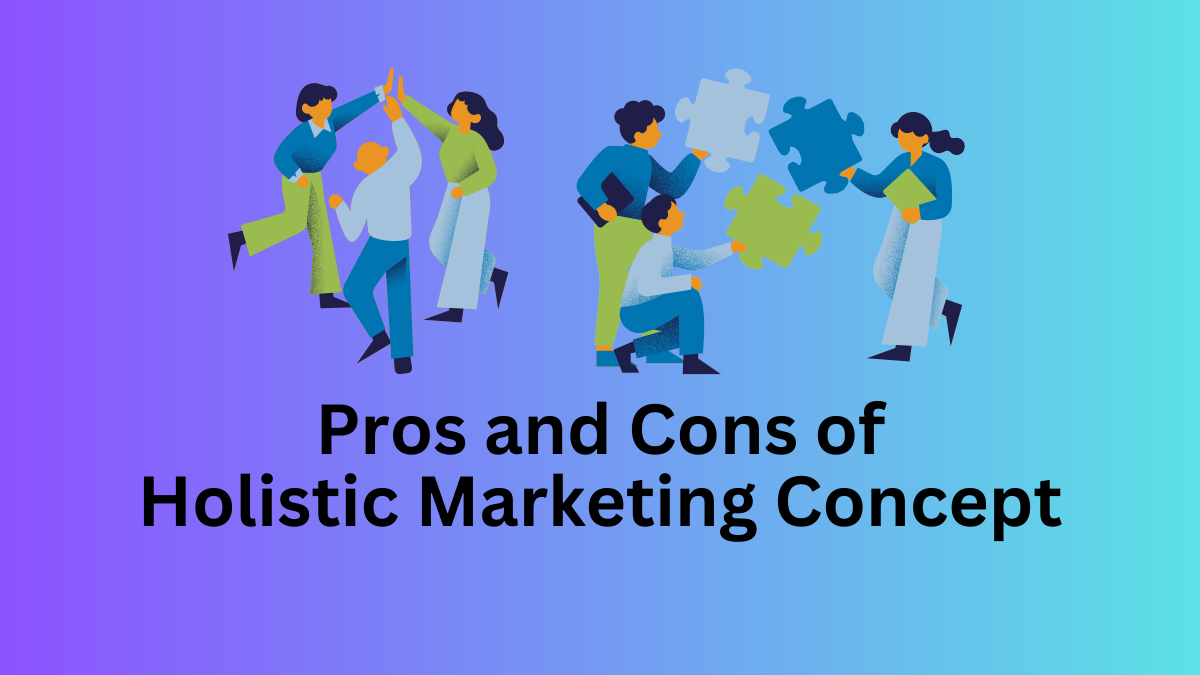Pros and Cons of Holistic Marketing Concept
The holistic marketing concept is the latest marketing philosophy that works in holism. It assumes the whole is greater than the sum of its components. Holistic marketing argues that for successful goal achievement, every component of the organization is necessary to work properly in sync.
Let’s explore some key pros and cons of holistic marketing concept.
Pros of Holistic Marketing Concept
The holistic marketing concept offers numerous advantages that empower businesses to thrive in today’s dynamic landscape.
Efficiency through Integration
Embracing holistic marketing encourages logical collaboration among all business units, enhancing operational efficiency and resource allocation. A synchronized approach minimizes redundancy and optimizes processes, contributing to cost savings and better resource utilization.
Strong Brand Identity
By producing consistent messaging and experiences across diverse touchpoints, holistic marketing forges a powerful brand identity. This cohesive branding strategy ensures that customers perceive a unified and compelling brand image, fostering recognition, trust, and loyalty.
Related: 8 Pros and 7 Cons of Societal Marketing Concept
Enhanced Customer Satisfaction
Holistic marketing places the customer at the center, aiming to understand their holistic needs. This approach enables businesses to tailor products, services, and experiences to match customer preferences accurately. The result is heightened customer satisfaction and loyalty.
Long-term Relationships
Holistic marketing prioritizes building enduring relationships with customers, stakeholders, and employees. By nurturing trust and connection over time, businesses can create a loyal customer base and garner support from stakeholders.
Adaptability to Change
In an ever-evolving market landscape, the holistic marketing concept shines. Its comprehensive view of the business ecosystem enables rapid adaptation to changing market trends, emerging technologies, and shifting customer behaviors. This adaptability enhances a business’s competitive edge.
Higher Employee Morale
Holistic marketing instills a shared sense of purpose among employees. When all departments collaborate towards a common goal, employees feel a stronger connection to the organization’s mission, fostering higher morale and team cohesion.
Positive Social Impact
The holistic approach underscores ethical and socially responsible business practices. By considering the impact on society and the environment, businesses can contribute positively to their communities, enhancing their reputation and fostering goodwill.
Read Also: Selling Concept Vs. marketing Concept: 12 Differences
Improved Decision-making
Holistic marketing provides decision-makers with a comprehensive understanding of the complex interplay between various business elements. Informed decisions can be made by considering the collective impact on brand image, customer satisfaction, operational efficiency, and societal responsibility.
Cons of Holistic Marketing Concept
While the holistic marketing concept brings valuable benefits, it also presents certain challenges that businesses should consider.
Complex Implementation
Integrating all business components requires substantial effort and resources. Coordinating diverse departments, strategies, and channels can be complex, demanding careful planning and management.
Resource Intensive
Adopting a holistic approach often involves investing in advanced technology, training, and cross-functional collaboration. This can strain resources, especially for smaller businesses with limited budgets.
Read Also: 8 Pros and 7 Cons of Marketing Concept
Resistance to Change
Shifting to a holistic marketing approach may face resistance from employees familiar with traditional methods. Adapting mindsets and processes to embrace the holistic philosophy can encounter initial pushback.
Time-Consuming
Achieving synergy across departments takes time. It requires aligning diverse perspectives, strategies, and goals, potentially leading to delays in implementation and decision-making.
Complex Metrics
Measuring the impact of holistic marketing efforts can be challenging. Connecting various elements and attributing results to the integrated approach can blur the lines of causation.
Risk of Overlooking Details
Focusing on the big picture might accidentally lead to overlooking specific details. Neglecting fine points in favor of a holistic view could impact product quality, customer experiences, or operational efficiency.
Not Suitable for All Businesses
The holistic marketing concept might not fit every business model. Some companies, especially those with specialized or niche offerings, might find the approach less applicable or effective.
Read Next: 8 Pros and 7 Cons of Selling Concept of Marketing
Arti Kushmi holds a BBS (Bachelor in Business Studies) degree and shares her business and marketing knowledge through this website. While not writing she will be reading and enjoying the moment.
